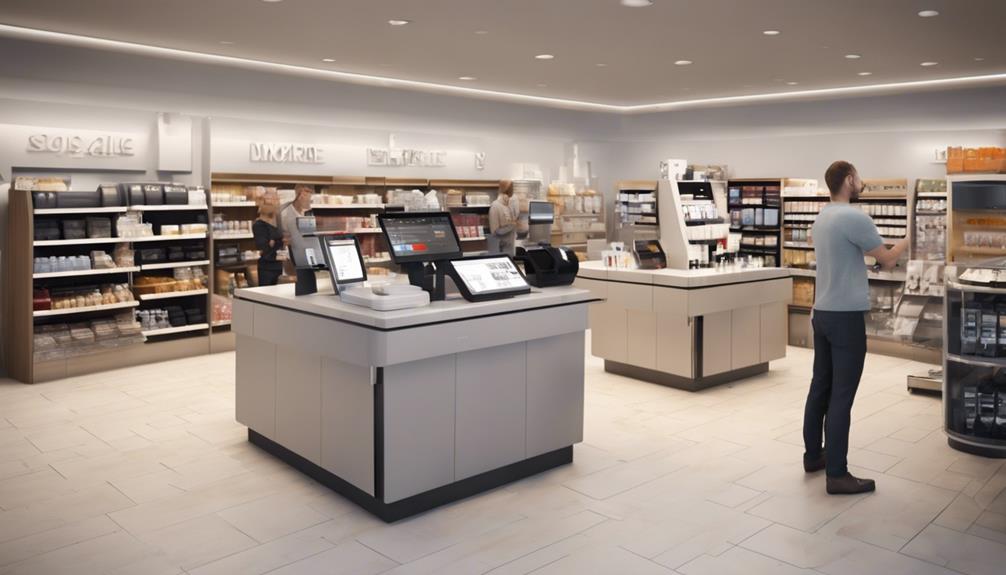When looking at credit card processing interchange rates, remember that debit card transactions often have lower fees than credit card transactions in North America. Credit card fees usually average 1.81%, while debit card fees are typically around 0.5%. For online e-commerce transactions, interchange fees can be higher at about 1.91%. Visa and Mastercard interchange rates vary from 1.25% to 2.5%, while American Express charges about 3.5%. These fees depend on factors like fraud risk, card type, and transaction details. Understanding these differences can help merchants optimize their processing costs effectively. Exploring interchange rates can offer valuable insights into managing transaction expenses and saving money. Dive into this topic to make informed decisions and save on fees in your business!
Key Takeaways
- Credit card interchange rates range from 1.6% to 2.4% in the US.
- Debit card transactions have lower rates, averaging around 0.5%.
- Visa and Mastercard interchange fees vary from 1.25% to 2.5%.
- American Express charges around 3.5% for credit card transactions.
- Understanding factors like card type and transaction type is crucial for controlling processing costs.
Average Interchange Fees Comparison
When comparing average interchange fees for credit card transactions, it becomes evident that debit card transactions generally feature lower rates. In North America, merchants processing credit card transactions encounter an average interchange fee of about 1.81%. On the other hand, debit card transactions tend to have more essential rates, averaging around 0.5%.
Online transactions, especially in the e-commerce sector, typically face higher interchange fees, hovering at approximately 1.91%. Visa and Mastercard interchange fees vary between 1.25% and 2.5%, while American Express tends to charge a higher rate of around 3.5%.
Understanding these differences in interchange fees is important for merchants aiming to optimize their payment processing costs. By choosing debit card transactions over credit card transactions whenever possible, businesses can effectively reduce their expenses. Additionally, being aware of the average interchange rates for different card types and transaction modes enables merchants to make informed decisions that positively impact their bottom line.
2024 Interchange Rates Analysis

Analyzing interchange rates for various card types and industries reveals distinct pricing structures that impact transaction costs substantially. MasterCard's debit interchange rate for in-person transactions is 1.050% plus 15 cents, while Visa's supermarket qualification rate for specific retail transactions is 1.50% plus 7 cents.
Discover offers an insurance consumer rate of 1.43% plus 5 cents for insurance-related purchases, and Visa's utility rate is 0.0% plus 75 cents for utility bill payments. American Express charges a Travel Services Signature PREF rate of 2.40% plus 10 cents for travel-related expenses.
Understanding these interchange rates is essential for businesses to optimize their credit card processing costs. By selecting the right card types and knowing the associated interchange rates, companies can effectively manage their expenses and maximize profits. It's essential to take into account the specific industry and transaction type to choose the most cost-effective payment processing options available.
Current US Interchange Rates Overview
Comparing the interchange rates for credit card transactions in the US reveals a range typically from 1.6% to 2.4%, with debit card rates hovering around 0.5%. Credit card networks such as Visa, Mastercard, Discover, and American Express each have their own specific schedules of interchange fees in the US. These rates are essential for merchants and cannot be avoided. They are set by credit card networks to cover operational costs and mitigate fraud risks. To provide a clearer overview, below is a table detailing the average interchange fee for credit card transactions and debit card transactions:
| Average Interchange Fee | |
|---|---|
| Credit Cards | 1.6% – 2.4% |
| Debit Cards | 0.5% |
Understanding these US interchange rates is vital for merchants to factor into their pricing strategies and operational budgets.
Understanding Credit Card Interchange Fees

Understanding credit card interchange fees plays an essential role in managing operational costs for merchants. These fees, set by credit card networks like Visa, Mastercard, Discover, and American Express, vary based on factors such as fraud risk, card type (debit vs. credit), rewards programs, transaction type (in-person vs. online), business category, and cardholder type.
For example, Visa's interchange rates for debit cards range from 0.80% to 1.75%, while credit card rates vary based on the specific card type. Mastercard also distinguishes between interchange fees for debit and credit cards, with rates ranging from 1.05% to 1.76% for debit transactions. Discover and American Express have their own interchange rate ranges for different card types as well.
Typically, interchange rates range from 1.6% to 2.4% for credit cards and around 0.5% for debit cards. By understanding these factors that influence interchange fees, merchants can make informed decisions to optimize their processing costs.
Average Credit Card Processing Costs Analysis

To investigate the domain of credit card processing costs, we explore the average fees incurred by merchants in North America as reported by the Merchant Payments Coalition. The average credit card processing fee in North America stands at 2.24%, with fees ranging between 1.3% to 3.5% per transaction.
Debit cards generally cost less for merchants to process compared to credit cards. Visa, Mastercard, American Express, and Discover each have varying average processing fees for credit card transactions. These fees can fluctuate based on the payment network, card type, and merchant category code.
Understanding these factors is essential for merchants to control their transaction costs effectively. By analyzing and comparing processing costs across different networks and card types, merchants can make informed decisions to optimize their expenses in the competitive market landscape of North America.
Frequently Asked Questions
What Is the Average Interchange Rate for Credit Card Processing?
We found out the average interchange rate for credit card processing is around 1.81%. In-person transactions typically have a 1.71% rate, while e-commerce faces a 1.91% rate due to fraud risk.
Which of the Four Major Credit Card Processing Networks Sets the Highest Interchange Rate Which Merchants Pay to Accept Credit Cards?
Being aware that American Express typically has the highest interchange rates among major credit card networks. Merchants accepting Amex may face higher fees. Understanding these differences empowers us to make informed choices and control payment processing costs effectively.
What Is the Level 3 Interchange Rate for Mastercard?
The Level 3 Interchange Rate for Mastercard is a specialized rate designed for specific B2B and government transactions. By providing enhanced data like line-item details, merchants can access lower interchange rates, resulting in cost savings.
What Is the Difference Between Level 1 Level 2 and Level 3 Processing?
We process Level 1, basic credit card data. Level 2 adds tax and customer info for lower rates. Level 3 demands detailed line-item specifics for the best rates. For B2B deals, Level 3 is key for savings and detailed records.
Conclusion
To wrap up, comparing credit card processing interchange rates can feel like trying to navigate a maze blindfolded. The numbers may seem overwhelming, but with careful analysis, you can find the best rates for your business.
Remember, it's all about finding that sweet spot where costs are low and efficiency is high. So, roll up your sleeves, crunch those numbers, and watch your profits soar!









